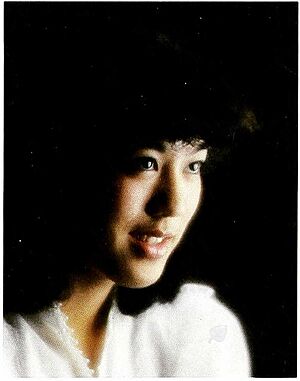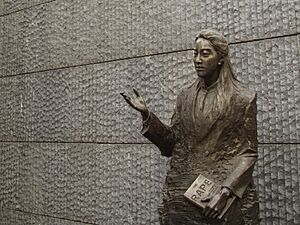Iris Chang facts for kids
Quick facts for kids
Iris Chang
|
|
|---|---|

Chang in c. 1985
|
|
| Born | Iris Shun-Ru Chang March 28, 1968 Princeton, New Jersey, U.S. |
| Died | November 9, 2004 (aged 36) Santa Clara County, California, U.S. |
| Occupation | Author, journalist, human rights activist |
| Alma mater | University of Illinois at Urbana-Champaign (B.A.) Johns Hopkins University (M.A.) |
| Period | 1995–2004 |
| Subject | Chinese Americans, Nanjing Massacre, Qian Xuesen |
| Spouse |
Bretton Douglas
(m. 1991) |
| Children | 1 |
| Iris Chang | |||||||
|---|---|---|---|---|---|---|---|
| Traditional Chinese | 張純如 | ||||||
| Simplified Chinese | 张纯如 | ||||||
|
|||||||
Iris Shun-Ru Chang (March 28, 1968 – November 9, 2004) was an American writer, journalist, and activist. She is famous for her best-selling book, The Rape of Nanking, published in 1997. This book told the story of the terrible events of the Nanjing Massacre. She also wrote The Chinese in America: A Narrative History in 2003. Her work inspired the 2007 documentary film Nanking, which was dedicated to her.
Contents
Early Life and Education
Iris Chang was born in Princeton, New Jersey, and grew up in Champaign-Urbana, Illinois. Her parents, Ying-Ying Chang and Dr. Shau-Jin Chang, were university professors. They had moved to the United States from China.
Growing up, Iris often heard stories about the Nanjing Massacre from her grandparents. They had managed to escape from the massacre themselves. When she looked for books about this event in her local library, she found there were none. This lack of information later inspired her work.
She went to University Laboratory High School of Urbana, Illinois, and finished in 1985. She first studied computer science in college. However, she soon changed her major to journalism. She earned her bachelor's degree from the University of Illinois at Urbana-Champaign in 1989. While in college, she also worked for New York Times and wrote several articles.
After college, she worked briefly for the Associated Press and the Chicago Tribune. She then earned a master's degree in Writing Seminars at Johns Hopkins University. She started her career as an author, giving talks and writing articles for magazines.
In 1991, Iris Chang married Bretton Lee Douglas, an engineer she met in college. They had one son named Christopher. Iris lived in San Jose, California, during the last years of her life.
Her Books and Career
Iris Chang wrote three important books about the experiences of Chinese people and Chinese Americans throughout history.
Thread of the Silkworm
Her first book, Thread of the Silkworm (1995), tells the life story of a Chinese professor named Qian Xuesen. He was a very important scientist who helped create NASA's Jet Propulsion Laboratory (JPL). He also helped the United States military. However, during the 1950s, he was wrongly accused of being a spy. He was kept under house arrest for five years.
Qian Xuesen returned to China in 1955. There, he helped develop China's missile programs.
The Rape of Nanking
Her second book, The Rape of Nanking: The Forgotten Holocaust of World War II (1997), was published 60 years after the Nanjing Massacre. Iris was partly inspired by her grandparents' stories about escaping this event. The book describes the terrible acts committed against Chinese people by the Imperial Japanese Army during World War II. It includes interviews with people who survived the massacre.
The Rape of Nanking was a huge success. It stayed on the New York Times Bestseller list for 10 weeks. A documentary film called Nanking was made based on her book in 2007. After the book came out, Iris Chang worked hard to convince the Japanese government to apologize for the wartime actions of its soldiers. She also wanted them to pay money to the victims.
The Chinese in America
Her third book, The Chinese in America: A Narrative History (2003), tells the history of Chinese Americans. It explains how American society often treated them as outsiders. The book uses many personal stories to show the strong feelings and challenges Chinese Americans faced.
Iris Chang wrote that "The America of today would not be the same America without the achievements of its ethnic Chinese." She also noted that many Chinese American celebrities, despite their success, have had their identity questioned.
Public Impact and Legacy
Because her books were so successful, Iris Chang became a well-known public figure. The Rape of Nanking made her a popular speaker and interview subject. She became a voice for those who felt the Japanese government had not done enough to apologize for its actions in China.
She once spoke directly to the Japanese Ambassador to the United States on television. She demanded an apology and said she was not happy with his vague statements. She felt that such unclear words made Chinese people very angry.
Iris Chang's public role grew even more with her last book, The Chinese in America. After she passed away, other writers honored her. The documentary Nanking was dedicated to her and to the Chinese victims of Nanjing.
Several books have also been dedicated to her memory. These include "The Man Who Ended History" by Ken Liu and The Poppy War by R.F. Kuang. In November 2019, Iris Chang Park opened in San Jose, California, dedicated to her.
Death

On November 9, 2004, Iris Chang was found dead in her car in Santa Clara County, California. News of her death deeply affected survivors of the Nanjing Massacre and the Chinese community.
Memorials
To honor Iris Chang, survivors of the Nanjing Massacre held a special service at the Nanjing Massacre Memorial Hall. This happened around the same time as her funeral in Los Altos, California. The Memorial Hall, which holds documents and photos from the massacre, added a new section and a bronze statue dedicated to Iris Chang in 2005.
In 2017, the Iris Chang Memorial Hall was built in Huai'an, China. In 2019, Iris Chang Park was opened in San Jose, California.
See also
 In Spanish: Iris Chang para niños
In Spanish: Iris Chang para niños
- Global Alliance for Preserving the History of WWII in Asia
- John Rabe
- Nanking (1937–1945)
 | Selma Burke |
 | Pauline Powell Burns |
 | Frederick J. Brown |
 | Robert Blackburn |

